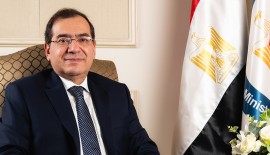With the rapid development of the Egyptian oil and gas sector, the formation of new professionals should follow up the pace. In this context, Egypt Oil & Gas took interest in knowing what the academia had to say about the country’s current position in Africa and the development of its youth.
Dr. Tharwat Hassane, Professor of Petroleum Engineering at the British University in Egypt (BUE) and the Future University in Egypt (FUE), and Advisor at a committee of energy at the Egyptian Parliament, talked to us about his views on the integration of youth and female employees in the market and on Egypt’s journey towards being a regional energy hub.
What are the key skills for young professionals to successfully integrate in the market?
Young professionals are the key for a bright future for the oil and gas industry in Egypt and worldwide. They are our upcoming leaders in our future projects. In order for them to prosper in this field, they must go through very intensive and essential deployment programs. These programs will train them for managerial skills, technical skills, and soft skills such as English language, technical writing, and economics. All of these courses will enable young professionals to fully understand the whole process of the oil and gas companies’ work and execution.
In addition, it is highly recommended that upcoming petroleum engineers have an established background prior to working; not only will that help with their efficiency, but will also have an economic factor of lowering costs.
Another advice would be exposing Egyptians to international experiences in the oil and gas industry, so that companies can share these experiences with their employees, which will be really helpful.
Managerial skills are really important. In upcoming generations of leaders and CEO’s of petroleum companies, I believe those should have a petroleum engineering background.
In your opinion as a Petroleum Engineering professor, how can academia reduce the gap between theory and practice and help students develop the necessary experience to enter the oil and gas sector?
First of all, academia is really important as it is the start for many petroleum engineers to get exposed to the oil and gas industry. Thus, any prior knowledge before entering the workforce will be directly coming from there. Therefore, universities should hire professors with practical experience, not only those that have only academic knowledge. In addition, it is important for students to not only stick to the course, but also become aware of the contemporary issues that face the industry as well as to having suggestions of solutions for the problems.
Professors with experience will help pass on the technology updates and share real life applications with them. Unfortunately, many universities do not go looking for these specifications, so in order to reduce or even close this gap there should be many trainings and visits to the oil industry. As I mentioned other times, the government should build a huge practical training center which delivers the practical experience to young professionals and students. Many countries have already done that, such as the UAE, Saudi Arabia, and Malaysia. By establishing this training center, which will increase the practice time for students, you can imagine the progress we can go through not only as an oil industry but as a country.
We have many experienced gurus from the oil and gas industry who can help in such trainings as they already work in international companies worldwide. I am sure the international companies will help fund and aid such an establishment for the benefits it will provide for both entities.
How can the sector encourage female students to pursue careers in oil and gas, and how does gender parity affect the industry as a whole?
During my university years, the petroleum engineering department did not allow female students to enroll or even think about this whole field as it was considered a “male-dominated field” and because “women could not be working in deserts”. This ignorance has finally faded away as we can all see the potential of women in the field rise day by day.
Diversity is needed because why would it not be? Females are well respectable people who deserve the rights we men are taking for granted. We do not realize how privileged we are until we compare ourselves to women in the industry. Women are underrepresented in the oil and gas industry and for that to stop, each company should hire a reasonable percentage of women and men; in addition to that, there should be no pay gap.
The sector can help encourage these females by organizing campaigns for women in the field and providing workshops that will aid them throughout their careers. In addition to that, initiatives like the Egypt Petroleum Show (EGYPS) Women in Energy Awards build up appreciation for all our hard-working females. This sends a message to women that are trying to pursue this career that they are visible.
In your opinion, what role does Egypt play in the African natural gas market?
Egypt is a very import country in Africa. It has the infrastructure for natural gas exporting (Idku and Damietta) that connects Egypt to other countries and brings the whole North African region, as well as the Middle East, to a more enhanced position in the market.
How can Egypt compete with main natural gas exporters like Nigeria and Algeria?
Competing with the main natural gas exporters in Africa could be done by increasing natural gas production through new discoveries. For that, Egypt could increase exploration in the West Mediterranean. Egypt has also a lot of potential in the unexplored waters of the Red Sea.
However, only increasing production would not be enough. Energy sources have to be diversified to save more from the natural gas used for electricity generation and contain the high demand of the product.
Egypt’s current move towards becoming a regional energy hub and engaging with new markets, such as in the European Union, also make Egypt more competitive.








